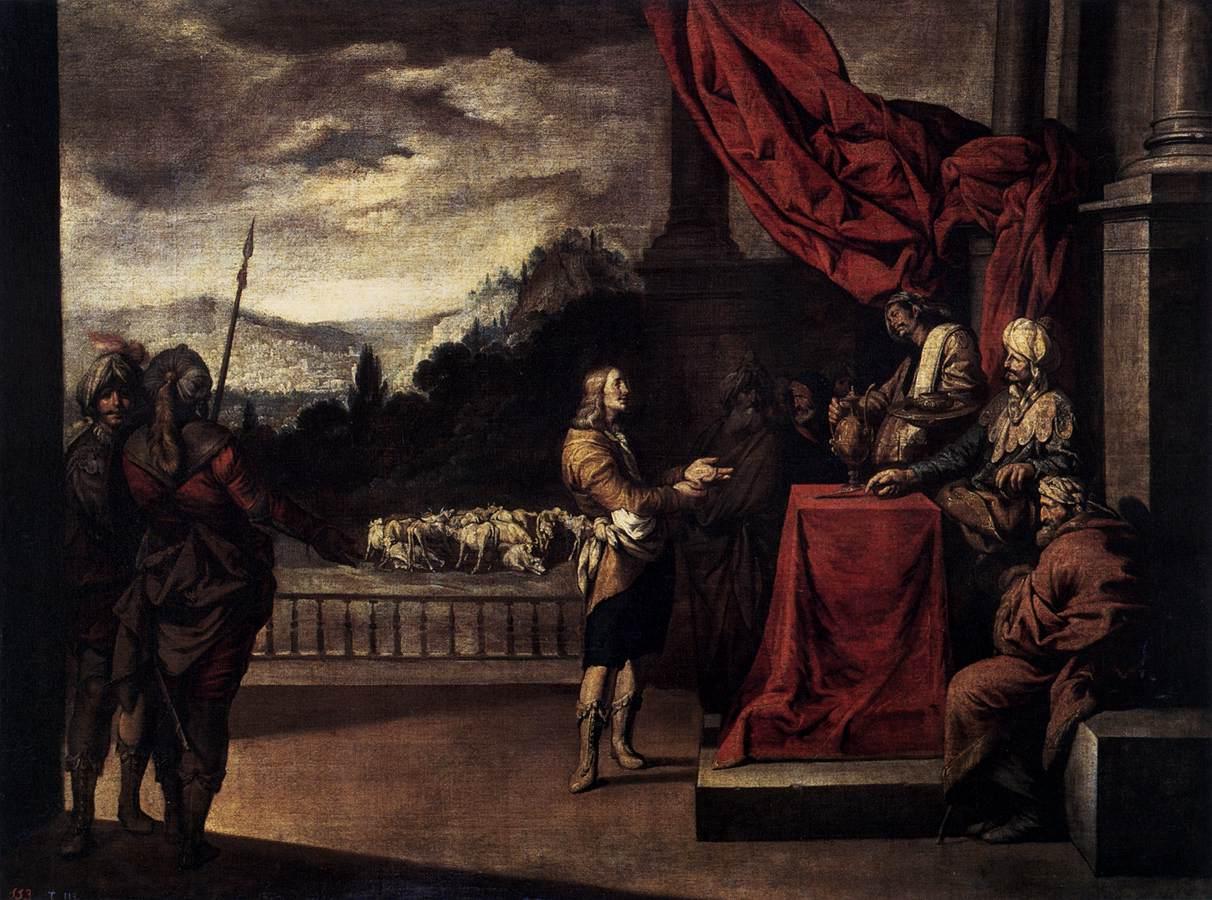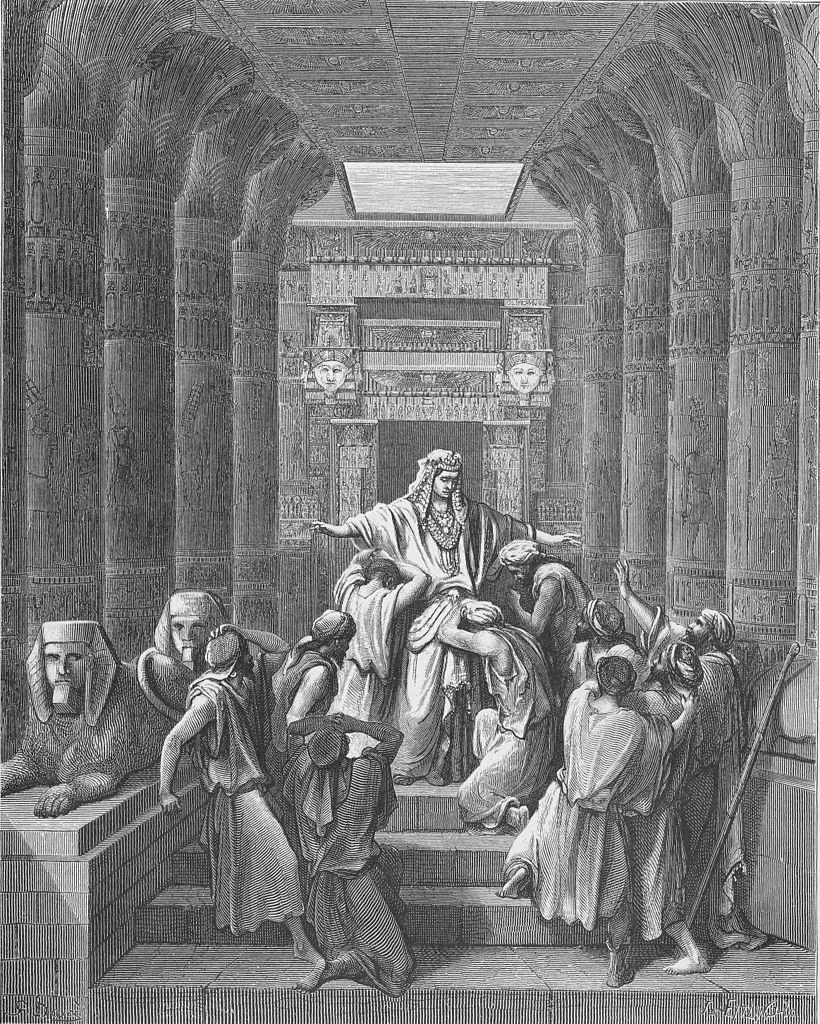So Joseph is taken to Egypt and sold to Potiphar, the captain of Pharaoh's guard. Fortunately, Joseph turns out to be an unusually capable servant, so Potiphar makes him overseer of his household. Of course, God has a hand in it: "the LORD blessed the Egyptian's house for Joseph's sake; and the blessing of the LORD was upon all that he had in the house, and in the field."
Joseph was also good-looking, and he attracted the notice of Potiphar's wife, who tried to seduce him. But Joseph argued that he didn't want to betray Potiphar's trust: "There is none greater than I; neither hath he kept any thing from me but thee, because thou art his wife: how then can I do this great wickedness, and sin against God?"
But Potiphar's wife kept at him constantly. One day, Joseph finds himself alone in the house with her, and she grabs hold of his garment, begging him to have sex with her. When he runs away from her, the garment comes off in her hand, and she holds on to it.
 |
| Bartolomé Esteban Murillo, Joseph and Potiphar's Wife, 1640-1645 |
Chapter 40
These come to include the chief butler and chief baker to Pharaoh, who do something to offend him. One night, each of these men has a dream. The butler dreams that he saw a vine grow up with three branches, and that he took the ripe grapes, squeezed them, and gave the juice to Pharaoh.
 |
| Benjamin Cuyp, Joseph Interpreting the Dreams of the Butler and Baker, c. 1630 |
In the baker's dream, he had three white baskets on his head. In the top basket there were "all manner of bake-meats for Pharaoh, and the birds did eat them out of the basket upon my head." Joseph tells him that the three baskets are also three days, but that after the end of three days Pharaoh will have the baker hanged and the birds will eat the baker's flesh.
Sure enough, after three days, the baker is hanged and the butler is restored to his old position. "Yet did not the chief butler remember Joseph, but forgat him."
Chapter 41
Two years later, Pharaoh has a dream. He was standing by the river and seven fat cattle came to feed in the meadow. Then seven skinny cows come to join them, and they eat up the fat ones. Then he dreams again of seven healthy ears of corn that are devoured by seven that are "thin and blasted with the east wind." Pharaoh sends "for all the magicians of Egypt, and all the wise men therof," but none of them can interpret the dreams.
But the butler hears this and remembers Joseph interpreting his dream and that of the baker, so Pharaoh sends for Joseph, who "shaved himself, and changed his raiment, and came in unto Pharaoh." He tells Pharaoh that he doesn't interpret the dreams himself, but "God shall give Pharaoh an answer of peace." So Pharaoh tells Joseph the dreams of the cattle and the ears of corn.
 |
| Antonio del Castillo, Joseph Explains the Dream of Pharaoh, first half of 17th century |
Pharaoh tells Joseph he knows just the man for the job:
Forasmuch as God hath shewed thee all this, there is none so discreet and wise as thou art:He gives Joseph a ring from his own finger, dresses him in fine linen and puts a gold chain around his neck, then has him ride in the second-best chariot he has, as people bow to him as "ruler over all the land of Egypt."
Thou shalt be over my house, and according unto thy word shall all my people be ruled: only in the throne will I be greater than thou.
 |
| Antonio de Castillo, The Triumph of Joseph in Egypt, c.1655 |
Chapter 42
When the famine comes, Joseph opens the storehouses so that Egypt has plenty. Other countries take note and begin coming to Egypt to buy wheat. Joseph's father, Jacob, observes that Egypt has grain for sale, so he sends ten of Joseph's brothers to Egypt to buy it. Only Benjamin, Joseph's youngest brother, stays behind with Jacob, because the old man can't bear the thought of losing him.
Joseph recognizes his brothers when they arrive in Egypt to buy grain from him, but he pretends not to. Instead, he charges them with being spies and throws them in prison. After they have been there for three days, he tells them to leave one of the brothers as a hostage, while he sends them and the grain they need back home. But they must return with their youngest brother to prove that they aren't spies.
The brothers decide that they are being punished by God for what they did to Joseph, and Reuben reminds them that he told them so. Joseph overhears them, but because he has been speaking to them through an interpreter, they don't realize that he understands what they're saying. He has to hide his face from them because he is moved to tears, but he gets control of himself and takes Simeon as hostage, then sends them away.
Without their knowledge, he has the money they have brought to pay for the grain put in the sacks with it. One of the brothers discovers the money when he opens the sack to feed his ass at the inn. They are terrified that they'll be discovered and taken as thieves.
When they get back to the land of Canaan, they tell Jacob what has happened, and that this imposing governor of Egypt has ordered them to return with Benjamin. And when they discover that the money has been placed in all of their sacks, they are more frightened. Jacob is particularly distressed because not only has he lost Joseph and Simeon, but now he is threatened with losing Benjamin. Reuben promises Jacob that he will bring Benjamin back to him, and that if he doesn't Jacob can kill Reuben's own two sons. But Jacob is too terrified of losing Benjamin to agree.
Chapter 43
When the grain they brought from Egypt is gone, however, Jacob tells the brothers to go back and get some more. But Judah reminds Jacob that the governor won't even see them if they don't bring Benjamin with them. Why did you have to tell him you had another brother? Jacob complains. Because he asked, they explain. And Judah insists that he will take good care of Benjamin, and if he doesn't he will "bear the blame for ever."
So Jacob gives in, and adds a gift to give this governor: "a little balm, and a little honey, spices, and myrrh, nuts, and almonds." And they should take twice as much money as they need, in case they're called to account for the money that they unwittingly brought back from the first trip to Egypt.
When they get to Egypt, and Joseph sees that they have brought Benjamin with them, he gives orders that the brothers shall dine with him at his house. The brothers are terrified at the invitation, thinking that it's a trap, and that they'll be seized for taking back the money they brought on the first trip. So when they get to Joseph's house the tell the steward about the money they found in the grain sacks, and that they've brought it back with them. But the steward assures them that it was God's work, and he brings out the hostage Simeon as well.
They are taken in and given water to wash their feet, and their asses are fed. When Joseph arrives, they give him the gift and bow down to him. Joseph asks if their father is still alive, and they assure him he is. And he welcomes Benjamin. Then he hurries off to his own chamber to weep. He returns after washing his face, and they sit down and eat and drink "and were merry with him."
Chapter 44
Joseph gives the steward orders to fill his brothers' sacks and to put the money they had brought in the sacks again. And in Benjamin's sack, he also has the steward put his own silver cup. Then, the next morning, after the brothers have left the city, he tells the steward to go after them and ask, "Wherefore have ye rewarded evil for good?"
The brothers protest at the accusation, and say they can search the sacks. Anyone who has stolen from Joseph's house, they say, can be put to death, and they will become Joseph's slaves. So they start searching the sacks, and when they reach Benjamin's they find the cup. They tear their clothes at the discovery, and return to the city, where they fall at Joseph's feet. Judah says, "God hath found out the iniquity of thy servants," and says they will become Joseph's servants now. But Joseph says he wants only the one in whose sack the cup was found to serve him. The rest can go back to their father.
Judah begs Joseph not to do this: "We have a father, an old man, and a child of his old age, a little one; and his brother is dead, and he alone is left of his mother, and his father loveth him." Jacob will die if Benjamin doesn't return with them, especially after losing his other brother. Judah offers to take Benjamin's place and be Joseph's servant.
Chapter 45
Joseph begins to cry, and sends everyone away except his brothers. Then he tells them, "I am Joseph; doth my father yet live?" The brothers are astonished, but Joseph continues, "I am Joseph your brother, whom ye sold into Egypt." Then he tells them not to regret what they did, because it turned out for the good: "God did send me before you to preserve life" by making the famine less severe than it might have been, and to save their lives by having grain to sell them. "So now it was not you that sent me hither, but God."
 |
| Gustave Doré, Joseph Reveals Himself to His Brothers, 1866 |
So he tells them to hurry back to their father, and tell him that his son is "lord of all Egypt," and to come and live near him in the land of Goshen. He'll take care of them, for there are still five more years of famine to come. He hugs Benjamin and weeps, then kisses all the brothers and weeps with them too. When he hears of this, Pharaoh is pleased as well, and tells Joseph to promise his father and his households that they "shall eat of the fat of the land."
So Joseph gives them wagons and changes of clothing, and gives Benjamin "three hundred pieces of silver, and five changes of raiment." He sends his father "ten asses laden with the good things of Egypt, and ten she asses laden with corn and bread and meat for his father by the way."
So the brothers go back to Jacob and tell him that Joseph is alive, and governor of Egypt. Jacob doesn't believe them at first, but when he sees the wagons Joseph has sent for him, he decides, "I will go and see him before I die."
No comments:
Post a Comment